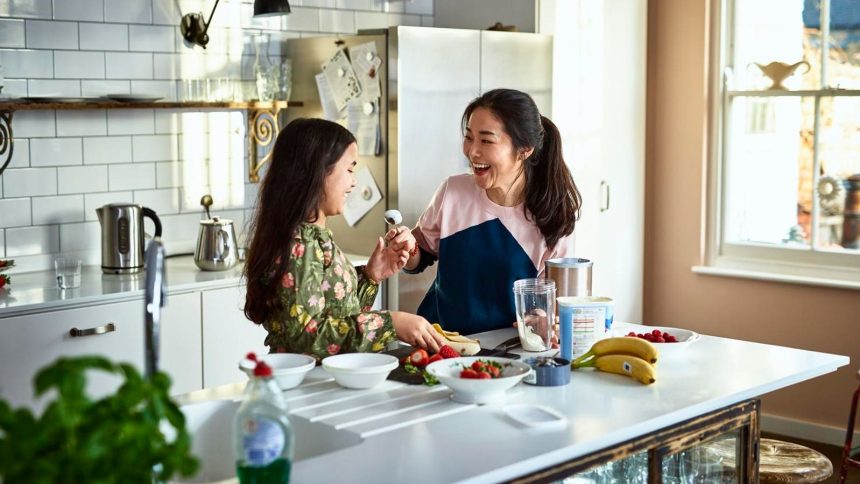If your food budget feels inflated despite not making any major changes, you’re not imagining it. According to research by the U.S. Department of agriculture, average annual food-at-home prices were 5.0 percent higher in 2023 than in 2022.
A study by Cornell researchers found that the average person makes approximately 35,000 remotely conscious decisions a day. And while this number sounds exaggerated, the researchers showed that we make 226 decisions each day on food alone. When we face so many decisions and make choice after choice, it’s no wonder our mental energy and willpower are totally depleted.
You have likely heard the advice to cook all the time and buy in bulk to save money. On the contrary, keeping my kitchen in a minimalist state for over a decade has been one of the biggest contributions to my ability to retire early. Here are three personal strategies that’s helped me maintain this habit for over a decade.
Stack The Lean Kitchen With A Zero-Based Budget
Keeping a lean kitchen is the perfect habit to stack with a zero-based budget by incorporating it into your monthly budgeting routine. During your budgeting time, take inventory of what you already have stored in your refrigerator, kitchen counters and pantry. This not only prevents impulse purchases but also ensures that every ingredient serves a purpose and you just buy what you need.
My husband and I applied the inventory management principle of “first in, first out” (FIFO) to our kitchen, ensuring that older products are eaten before newer ones. The FIFO approach jives with our habits to minimize food waste and maximize value by organizing my pantry and refrigerator to prioritize older items at the front.
I batch cook and freeze portions for future use once a month if I’ve noticed any ingredients that have been sitting around for a while. I considered my freezer for obvious things like meats and packaged frozen items, but now I freeze bagels, cookies, spices and other things that in the past I’ve just forced myself to eat faster instead of spreading them out.
By utilizing ingredients to their fullest potential, you can mirror the principles of the zero-based budget by making sure all your consumables get down to zero on a monthly basis.
Prioritize Fresh Over Bulk
While buying in bulk may seem like a cost-effective option, I learned from the my financial program participants that it often leads to unnecessary expenditures and waste in the long run. Bulk buying only starts to make financial sense for families of five or more in my experience as a coach. I got my first Costco membership recently and while I like buying certain items there, I’ve found that I’m buying more random things (like giant plush toys and desserts) than had I just gone to a regular grocery store.
In a lean kitchen, prioritizing freshness over bulk ensures that you only buy what you need, when you need it. Fresh ingredients not only taste better but are generally healthier to their bulk packaged counterparts. Even better, buying fresh once a week allows for greater flexibility in meal planning. We enjoy going to our local international grocery store once a week and challenge ourselves to try a new protein source or produce than from the previous week.
Rather than being constrained by large quantities of the same products, you have the freedom to experiment with diverse recipes and flavors. This not only keeps meals exciting but also reduces the likelihood of food fatigue, where repetitive meals become uninspiring.
For example, we buy a cooked rotisserie chicken for convenience at the beginning of the week, but we’ll turn it into different meals throughout the week thanks to adding in different carbs, spices and vegetables. The one rotisserie chicken turns into tacos, stir fried rice, chicken salad sandwiches, chicken noodle soup, and spring rolls with that one convenient purchase!
The habit we’ve adopted from our love of Korean culture is the idea of “banchan.” Banchan refers to the assortment of small side dishes served alongside a main course in Korean meals These side dishes include items like kimchi (fermented vegetables), namul (seasoned vegetables), pickled vegetables, fish cakes, tofu, and other small dishes.
Cut Down The Kitchen Clutter
A cluttered kitchen not only impedes efficiency but also leads to overspending. Unused gadgets, expired ingredients, and duplicate items clutter valuable space and honestly make me crazy. Friends and family that come over to our place comment how clean our kitchen is and how uncluttered our refrigerator is.
My Filipino mom always had a packed kitchen, whether it was leftovers in the fridge, meats in the freezer, pots and pans she collected over the years and her ever growing collection of plates and serving ware for each season. Doing the opposite is my form of rebellion.
You don’t need a ton of kitchen gadgets to cook great meals. The tools that we use the most frequently are:
- an air fryer, replacing toaster, oven and frying;
- a pot for boiling pasta, noodles and soups;
- a pan set of two different sizes;
- a wok – we use this the most frequently;
- a bamboo steamer that fits nicely on top of the wok; and
- a combo rice cooker/ slow cooker.
We no longer keep free cups we get from events. We stopped collecting coffee mugs and we don’t buy into the next water bottle craze. We do keep a matching set of eight reusable storage containers that we replace them once a year that keep our refrigerator neat and organized. Once a month, I re-organize my kitchen to put everything back in the place it should be.
The major game changer in saving money for us was one simple switch: eating from smaller plates and bowls. Normal dinner plates are 10 or 12 inches, but we eat from 7.5 inch plates. Our bowls are also smaller than the larger cereal bowls that we see in other American households. Our non-Asian friends who we’ve invited over for meals have commented how small our plates are, but over time they’ve shared that they switched their habit over to smaller plates, too.
By you making fewer and higher quality food choices a day, you can spend more brain power making higher quality and tougher choices in your finances. Maintaining the habit of a lean kitchen can significantly impact your financial health and your sanity.
Read the full article here














